Deodorant and antiperspirant: what's the difference?
Deodorant and antiperspirant both fight bad sweat odors. Yet it's not at all the same process and the same thing for the body, just look at their ingredients.

And because we're not all as learned as Jean-Michel, our chemist, we asked him to explain the difference between the two with simple words...
Antiperspirant: creating inflammation using aluminum salts
An antiperspirant is formulated with aluminum salts, which act according to the following mechanism: They create irritation and inflammation of the area of application (the armpits), causing thickening of the skin. The pores of the sweat glands (aka the part of our body with the sexiest name) are then clogged due to the proliferation of cells: It's like blocking your natural sweating process with a plug.
Perspiration is thus artificially stopped, but the problem is that it is not very good for your body : aluminum is considered by some researchers and more and more studies as an endocrine disruptor and as a factor of increased risk of cancer. The French Health Safety Agency has also recommended limiting the aluminum concentration to 0.6% for antiperspirant products and avoiding the use of these products in the event of skin damage.
Not to mention the fact that sweating is a natural process that allows you to regulate your body temperature, to evacuate molecules that need to be and to detoxify your body: this is not a bad thing in itself, it is more the bad smells that are! By stopping sweat, anti-perspiration prevents your body from doing this!
In short, you will have understood: an antiperspirant is not tip top chanmax*.

*This expression, which has been banned since the 1990s, is Jean-Michel's favorite expression, our chemist: in order not to betray his words, we have kept it, but the company Merci Handy declines all responsibility in the event that it offends the most sensitive souls.
Alum stone: aluminum salts like the others!
And the alum stone, in all this? (We're not talking about Alain, your uncle who is a fan of drones and magic shows, but about alum, a mineral used by some to fight the smell of perspiration.) Faced with the suspicions hanging over aluminum salts , many people have turned to alum stone. It's a natural solution, but the problem is that it's also aluminum salt!

To be precise, as Jean-Michel says: It is a double salt of aluminum and potassium (KAl(SO₄)₂). From a toxicological point of view, it is exactly the same problem as antiperspirants based on aluminum salts.
“Alum stone and antiperspirants with aluminum salts, it's white hat and white hat” - Jean-Michel, our chemist, bringing another magnificent expression up to date, for our greatest pleasure.
Deodorant: fight against bad odors while taking care of your body
Thanks to its antibacterial agents (synthetic glycerin or even cinnamon bark as a natural ingredient), a deodorant fights against bacteria present in the armpits which, along with sweat, are responsible for bad odors. It's like sending little magic missiles that challenge the molecules responsible for bad odors to a duel and knock them out, without blocking the natural process of perspiration or hurting your little armpits.

In short: an effective deodorant, without aluminum salts and without alcohol, is much gentler for your body . Unlike an antiperspirant, it does not block perspiration or create inflammation, it simply acts on odors: Your body continues to expel the molecules that need to be, but once outside, your deodorant takes care of fighting against the bacteria responsible for bad odors.
That's why at Merci Handy we chose to create a deodorant: without aluminum salts , it helps fight bad odors while taking care of your little armpits. And rather than using alcohol for the antibacterial effect, which can irritate the armpits especially when they are shaved, we preferred an alcohol-free formula, even softer for your body.
We imagined 3 deodorants with fragrances extracted from the purest rainbows:
Namaste deodorant: the scent sweeter than your mom's hugs
Hello Sunshine deodorant: monoi and carefree holidays
Flower Power deodorant: the peace and love fragrance
At first, if you were using a synthetic antiperspirant or deodorant, you may sweat a little more than usual. Don't panic : your body has to get used to and adapt to this more clean and respectful formula, as if it were "lacking" the inflammation to which antiperspirants have accustomed it. After a few days, everything should be back to normal!
How to recognize an antiperspirant from a deodorant?
Just look at the ingredient list. If you find any of the following components: aluminum chloride, aluminum chlorydrex, aluminum chlorydrex, aluminum zirconium, aluminum sesquichlorydrate, or aluminum chlorohydrate; it is an antiperspirant. (Well, basically, when there is “aluminum” somewhere in the ingredient list, it's a bad sign).

But by the way, why do we sweat and where do the smells come from?
Sweating is a normal and natural phenomenon that plays several important roles for your body: regulating your temperature and evacuating toxins. Sweating may be increased under stress or physical exertion (during a high jump course over rainbows).
As a human, you sweat half to a liter of water a day ! (For comparison, unicorns sweat a quarter liter of stardust a day). When the temperature outside or that of our body is too high, the drops that spring from the pores of the skin serve to cool us down.
Sweat naturally does not give off an odor. The smell occurs following contact with bacteria that feed on perspiration. It is these micro-organisms, which proliferate with sweat, which are responsible for bad smells: hence the action of deodorants.




















